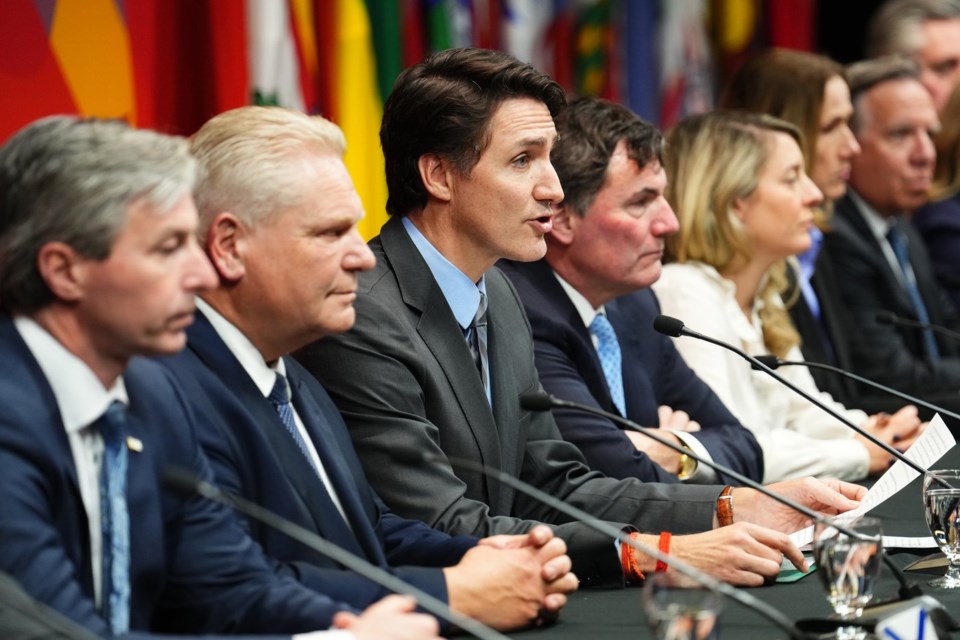OTTAWA — Canada appears to be leaning toward hitting the United States with matching tariffs if President Donald Trump makes good on his threats, but not all of the country's premiers support that approach.
The premiers met virtually with Prime Minister Justin Trudeau and other federal officials on Wednesday morning to talk about Trump's early moves as president and the looming threat of tariffs, which could come as soon as next week.
Trump signed an executive order on Monday directing his government to study alleged unfair trade practices by Canada and Mexico and file a report by April 1.
Later that day, he mused about imposing 25 per cent tariffs on both countries by Feb. 1.
Ontario Premier Doug Ford, who currently chairs the Council of the Federation, said Wednesday that premiers want to ensure Canada has a "solid plan."
"We know these tariffs are coming Feb. 1. We need to match those tariffs dollar-for-dollar, tariff-for-tariff, and make sure that it hurts the Americans as much as it hurts Canadians," he told reporters in Toronto.
The federal Liberal cabinet spent two days at a retreat this week, waiting to see what Trump might do and hammering out the details of its response.
The shifts in Trump's rhetoric and timelines are par for the course, Trudeau told reporters on Tuesday. He said his government has plans for a variety of scenarios and is ready to retaliate, and that he supports "the principle of dollar-for-dollar matching tariffs."
Saskatchewan Premier Scott Moe said Wednesday that while he is on board with the Team Canada approach, "broad-based tariffs, dollar-for-dollar tariffs with the U.S. is not in Canadians' best interest, nor should export tariffs ever be considered by our government."
Export taxes on energy were the key sticking point for Alberta Premier Danielle Smith after last week's meeting. She refused to sign a joint statement coming out of that meeting because the federal government would not exempt energy exports from its list of possible retaliatory actions.
Smith posted on social media on Wednesday that the meeting was "more positive this week" and that there's a growing consensus that Canada needs to commit to improving security at the border and boosting defence spending.
When he initially threatened to impose the tariffs, Trump said they were a response to what he called inaction by Canada and Mexico on illegal drugs and migrants entering the U.S. Canadian officials say less than one per cent of fentanyl or migrants entering the U.S. come from Canada.
The federal government still announced a $1.3-billion plan to boost security at the border in December, and this week the RCMP deployed two new helicopters to surveil the boundary.
Trump also has said the tariffs are a way to put pressure on Canada over the United States' trade deficit with this country.
Smith said there was also "general agreement on the need to focus more on constructive, proactive diplomacy with U.S. lawmakers rather than escalating rhetoric" at Wednesday's meeting.
Ford said Smith "understands we need to be united, and I understand that she wants to protect her main commodity."
"But country comes first, over anything, and you can't throw a tool away from the tool box," he added.
When asked whether Smith was now on-side with her colleagues, Ford said, "I think we're moving her along."
Quebec Premier François Legault said he was happy to see Smith at the meeting.
"It’s important that if we ask a province to make a special contribution, that the province agrees," he said outside a caucus meeting in Quebec's Laurentians region.
"As for retaliatory measures, we agreed on certain steps, but we are not going to reveal them," he added. "We’ll wait for Mr. Trump to file tariff increases before filing reprisals."
Trudeau's office said in a statement on Wednesday that preventing tariffs is still the government's top priority.
The group also agreed to tackle long-standing issues around trade within Canada.
Nova Scotia Premier Tim Houston said he'll stand behind the federal government's retaliation against what he called "the Trump tax," adding the looming trade war should be a signal that Canada needs to strengthen its own economy.
"That means looking at our own internal trade policies across the country, and asking ourselves simple questions like, 'Why is it so hard to send a bottle of wine from one province to another?'" he said.
The Committee on Internal Trade, a group that includes representatives from all provinces and territories and Internal Trade Minister Anita Anand, has agreed to convene an urgent meeting to talk about ways to ease the movement of goods within the country.
Anand posted on social media that "removing trade barriers within Canada could add up to $200 billion to our economy and mitigate the impact of tariffs."
The first ministers have committed to weekly meetings now that Trump has been installed in the White House.
This report by The Canadian Press was first published Jan. 22, 2025.
— With files from Allison Jones and Liam Casey in Toronto, Sarah Smellie in St. John's, Aaron Sousa in Edmonton and Morgan Lowrie in Montreal
Sarah Ritchie, The Canadian Press




